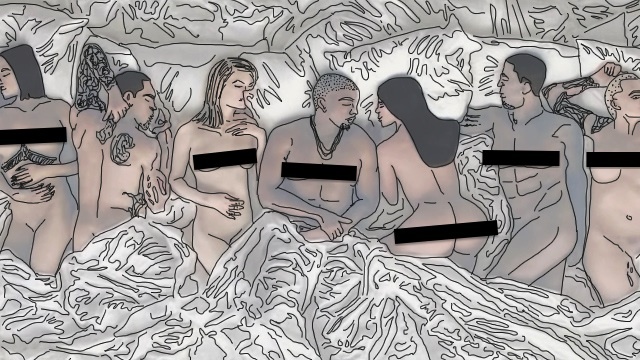Photo by Jackie Wong
I arrive early for my interview with Supermoon, walking around the block listening to their six-song EP to kill time. The tunes on Comet Lovejoy are joyous and upbeat, they beg to be danced to in your bedroom at night, and the fact none of them has been featured in an imitation 80s teen rom-com is frankly shocking. With such a sunny energy, the songs are only made more endearing when you notice the contrast in lyrical content. The second song on the EP is a gleeful tune with a driving bassline below a chipper voice chanting the words “To document my memory I teach myself photography/I watch a documentary of someone else’s tragedy/Tragedy is all I see, tragedy is all I see…” Supermoon balances earnestness and cynicism in a way that reflects a generation of liberated and confident girls experiencing womanhood in 2015.
Videos by VICE
The four ladies behind this band are not afraid to giggle and expose their sensitivities, but they are also smart and savvy about their careers as musicians and how their music has the potential to change the world around them. I loop the block one more time before meeting guitarist/bassist Adrienne LaBelle at the door of their jam space, I sneak through a group of four smoking punks and let her lead me inside. The muffled sound of many thrashing guitars greets me in the dank industrial building, but Supermoon’s room is a little quieter, it’s warm, drummer Selina Crammond and guitarists Alie Lynch and Katie Gravestock sit cross-legged on the floor clutching cans of cider.
Continued below…
We start things off talking about the phoenix-like journey Supermoon had in their process of creation. Rising from the ashes of the now defunct group Movieland, Supermoon was born from moments of casual conversation at an impromptu New Year’s Eve party. Crammond explains, “It was at our place. Adrienne and I were roommates, and we decided last minute to host a New Year’s Eve party. I was chatting to Katie on the couch and was saying how Movieland’s guitarist was too busy with her other projects to play with us. Katie was like, ‘Oh my god! I want to be in Movieland!’ Alie came up to us after midnight and said, ‘We came up with the best band name…Supermoon!’ That was going into 2015.”
Though the intention of Gravestock joining up was to prolong the life of Movieland, it became apparent very quickly that the way her style played in with the rest of the groups begged to be its own distinct sound. Gravestock brought new guitar parts to the mix and as a result Supermoon became its own animal, “Movieland was a lot more straightforward pop music, and this is different from that in a darker, jammier way. Katie is a completely different guitar player, she’s always aiming to get more dissonance,” explains LaBelle. The girls nod in agreement at this thought, Lynch giggles “It’s true! I’m always trying to end on the major and you’re always pulling that back.” Gravestock replies with a shrug, “I like to start off with pop, and then end it.” This definitely speaks to the yin and yang of Supermoon, their musical personalities combine to create the audio equivalent of a day where the sun is high in the sky, but the temperature is below freezing.
Though darker moments are present on Supermoon’s initial release Comet Lovejoy, the girls say that album only scratches the surface of their exploration with this direction. Gravestock says they’re going for a moodier sound, LaBelle says they’re eclipsing, Lynch says they’re getting weirder. The quartet are in the midst of creating their second release right now with the intention of recording in the spring. LaBelle compares the band’s writing process to the mystery solving board game Clue, “We will come in with skeletons of songs and they will turn out super different from where we started. It’s funny, we always seem to know when it isn’t working, but we might not be able to put our finger on it. It’s kind of like solving mysteries. We come in with some basic evidence, but we aren’t quite sure what happened. It’s all logic and detection, the song is always sitting in the envelope. We know that we’re going to get there and in the end we’re always like ‘Oh! It was professor Plum!”
Finding the character behind these new songs has meant switching roles by putting Lynch on bass and LaBelle on guitar. This switch up has played to their strengths in an unconventional way, “I don’t know how to play chords on the guitar, So it ends up being very weird. There’s a lot more duelling guitars when I play because I suck at chords. It’s not the basis of songwriting, it’s just a lot easier for me than writing riffs. I also make tons of noise when I play guitar, so it’s a little heavier,” says LaBelle. This heaviness contributes to Supermoon’s departure from their old pop-punk ways to exploring post-punk horizons. Lynch jokes that as things get darker and jammier the band might even break the three minute mark with some songs, “We’re still not totally sure if these songs will even be enjoyable to anybody but us. They’re really fun to play, and they’re really fun to write, but I have no idea how they’ll sound to people who haven’t been involved in the process. So that will be interesting, people might hate us now.”

Photo courtesy Hanna Fazio
Though I can’t speak for the wily likes and dislikes of music consumers today, if Supermoon’s past successes are any indication, a mass exodus shouldn’t be on their worry list. Though they have not yet claimed their place on the bill of Coachella or eaten snacks in the green room at Madison Square Garden, they have gained a loyal following in Canada, a noble second best. Many of these followers have come in the form of sweaty teenage girls on the precipice of feminist liberation. LaBelle explains one of the best shows Supermoon has ever played was to a room full of these particular audience members, “Allie gave a little bit of a speech about women in music. We were the only women on the bill, it was all teen boys. A bunch of girls were there with their boyfriends kind of thing, so after the show one of the boyfriends came up to us and said ‘Oh my girlfriend, she wants to start a band now she saw you guys.’ There have been a few instances of that, where younger girls are inspired by seeing women in music. For me, that’s a cool part of it. We didn’t decide to make an all girl band to prove a point, It’s not like we’re there with this message we need to send to the world, it’s more a vehicle for creativity. But it’s nice to pass it along.”
The creation of the band was far from a radical feminist statement, but unintentionally the women of Supermoon are participating in an age old tradition of passing the baton of ability to a new generation of impressionable ladies. Most of the band’s members remember when they first saw a woman playing rock music and the lasting effect it had on them. Not that gender was the exciting part, instead the rush of seeing someone in the spotlight that was truly relatable was what provided kicks. Gravestock however didn’t get to experience this rush until later in life, “Even as a teenager, I didn’t really have any female musician role models. When I was in my 20s I used to play music with my boyfriend, and he was really sexist. One time he pulled the cord out of my amp because he said I was playing too loud, after that I packed my guitar away for at least two years and didn’t play. It’s been great for me to find a whole new group of females in music, there are so many musicians to play with now, it’s been really inspirational for me.”
With this positive creative energy the girls foster in each other comes a distinctly feminine sound; the songs of Supermoon are kick-ass, cutting, humorous, and take on the bullshit of everyday life with zen like perseverance and joy. Though these are qualities I often associate with femininity, I’m sure this description would make the foursome cringe. It is nearly impossible to be in an all girl band and not have the prominent gender be a constant talking point. Supermoon aim to be a really good band, not a really good girl band. “We always get cute. That’s the number one adjective. Or a description of our hair colour. I remember there was one review in the Vancouver Sun I literally looked at and did a content analysis. They listed all the bands playing at the show, granted it was really boring journalism, they called everything pop-punk or post-punk or whatever-punk. They described Supermoon as Supergirls, and I’m just like ‘Really? Girl is our genre?’ It was so blatant, and lazy and boring.”
Gender politics aside, social media campaigns aside, music video production aside, more than anything Supermoon are just happy they have each other, and a smelly punk infested jamspace roof over their heads to practice in once a week. In this sense they really are a jam band, they play for themselves and each other, an innocent happy act untainted by the high-stakes social climbing necessary to be a Pitchfork reviewed band in 2015. Without Supermoon, Lynch wonders where her and her bandmates would be right now “What would we be doing? Would we have well paying jobs?” Adrienne LaBelle’s mum wants her to re-apply for the grocery bagging job she had in highschool, Selina Crammond’s parents wish she was a dental hygienist in Manitoba, Katie Gravestock is working three jobs and earning a degree, and Alie Lynch is wondering who wants to hire a post-secondary educated gal who studied english and history. But at night when the clouds part you can find them sitting in a circle clutching cans of cider howling to the moon about burnouts and powersuits, shining 30% brighter than their usual selves. From bedrooms in British Columbia to mop closets in Minneapolis, cynical optimists everywhere howl along with them. Supermoon have the tidal power to pull us from the mundanity of our lives and into their circle, where we can laugh and sing about our tragedy together, growing bigger and brighter in the process.
Maya-Roisin Slater is writer and reporter based in Vancouver. Follow her on Twitter.




